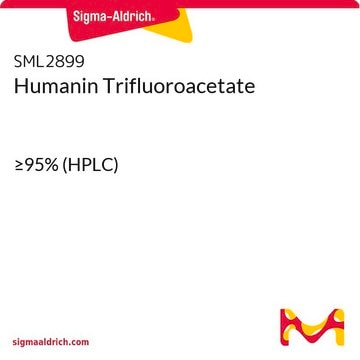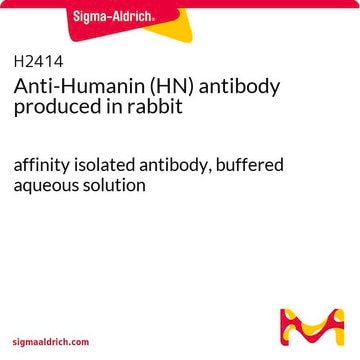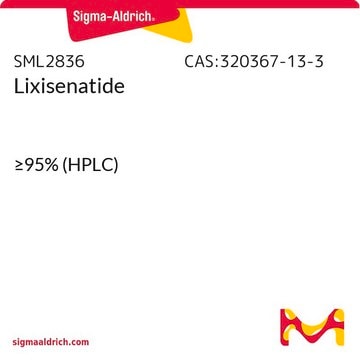H6161
[Gly14]-Humanin G human
≥95% (HPLC), powder
Synonym(s):
S14G-humanin, HNG
Sign Into View Organizational & Contract Pricing
All Photos(1)
About This Item
Recommended Products
biological source
human
Quality Level
Assay
≥95% (HPLC)
form
powder
mol wt
2654.2-2660.2 Da
storage condition
(Keep container tightly closed in a dry and well-ventilated place)
technique(s)
activity assay: suitable
solubility
water: 1.00-1.04 mg/mL, clear, colorless
shipped in
dry ice
storage temp.
−20°C
Amino Acid Sequence
Met-Ala-Pro-Arg-Gly-Phe-Ser-Cys-Leu-Leu-Leu-Leu-Thr-Gly-Glu-Ile-Asp-Leu-Pro-Val-Lys-Arg-Arg-Ala
General description
Research area: Neuroscience
[Gly14]-humanin (HNG) belongs to the family of mitochondrial-derived peptides. HNG (humanin-G) is an analog of humanin, generated by S14G (serine-14-glycine) mutation. HNG shows a 1000 times stronger activity.
[Gly14]-humanin (HNG) belongs to the family of mitochondrial-derived peptides. HNG (humanin-G) is an analog of humanin, generated by S14G (serine-14-glycine) mutation. HNG shows a 1000 times stronger activity.
Application
[Gly14]-Humanin G human has been used:
- along with bortezomib in pharmacological inhibition studies to treat mice to limit the toxic effects of bortezomib
- to study its effect on high glucose (HG)-induced apoptosis of endothelial cells (ECs)
- to study its neuroprotective effects in an in vitro oxygen-glucose deprivation/reoxygenation (OGD/R) model using SH-SY5Y neuroblastoma cells
[Gly¹⁴]-Humanin G human has been used to limit the toxicity during the bortezomib treatment in neonatal brachial plexus injury (NBPI) mice model. It has also been used in the cell culture of the human-derived neuroblastoma cell line.
Biochem/physiol Actions
Endogenous rescue factor abolishing neuronal cell death by a wide spectrum of familial Alzheimer′s disease genes and Aβ
[Gly14]-humanin (HNG) stimulates cell growth, proliferation, and cell cycle progression. It enhances proteins such as kinases, transporters, transmembrane receptors, and transcription and translational regulators. HNG exhibits intense in vitro neuroprotective effects compared to natural HN. Studies show that it is an effective cytoprotectant both in vitro and in vivo. HNG is found to prevent high glucose (HG)-induced apoptosis of endothelial cells (ECs). It is proven to inhibit AngII-induced phenotypic switch in vascular smooth muscle cells (VSMCs).
antibody
Storage Class Code
11 - Combustible Solids
WGK
WGK 3
Flash Point(F)
Not applicable
Flash Point(C)
Not applicable
Personal Protective Equipment
dust mask type N95 (US), Eyeshields, Gloves
Certificates of Analysis (COA)
Search for Certificates of Analysis (COA) by entering the products Lot/Batch Number. Lot and Batch Numbers can be found on a product’s label following the words ‘Lot’ or ‘Batch’.
Already Own This Product?
Find documentation for the products that you have recently purchased in the Document Library.
Qingnian Goh et al.
FASEB journal : official publication of the Federation of American Societies for Experimental Biology, 35(2), e21214-e21214 (2020-11-26)
Neonatal brachial plexus injury (NBPI) causes disabling and incurable contractures, or limb stiffness, which result from proteasome-mediated protein degradation impairing the longitudinal growth of neonatally denervated muscles. We recently showed in a mouse model that the 20S proteasome inhibitor, bortezomib
Xin Wang et al.
Biomedicine & pharmacotherapy = Biomedecine & pharmacotherapie, 110, 248-253 (2018-12-06)
Skin provides the protective barrier for our body and undergoes the continuous regeneration in order to overcome damage from exposure to harmful environments and wounds. Epidermal stem cells (ESCs) play critical roles in skin regeneration. Humanin analogue, S14G-humanin (HNG), a
Sia Nikolaou et al.
JCI insight, 4(23) (2019-10-30)
Muscle contractures are a prominent and disabling feature of many neuromuscular disorders, including the 2 most common forms of childhood neurologic dysfunction: neonatal brachial plexus injury (NBPI) and cerebral palsy. There are currently no treatment strategies to directly alter the
Cytoprotective role of S14G-humanin (HNG) in ultraviolet-B induced epidermal stem cells injury
Wang X, et al.
Biomedicine and Pharmacotherapy, 110 (2019)
Bo Su et al.
Aging, 15(14), 6822-6833 (2023-07-15)
Asthma is a chronic inflammatory disease with a high morbidity rate in children and significantly impacts their healthy growth. It is reported that Th2 cell-mediated airway inflammation and activated oxidative stress are involved in the pathogenesis of asthma. S14G-humanin (HNG)
Our team of scientists has experience in all areas of research including Life Science, Material Science, Chemical Synthesis, Chromatography, Analytical and many others.
Contact Technical Service




![[Nle4, D-Phe7]-α-Melanocyte Stimulating Hormone trifluoroacetate salt ≥95% (HPLC)](/deepweb/assets/sigmaaldrich/product/structures/276/187/9733edf4-6412-4f2b-8cc6-c3f9f3425d4d/640/9733edf4-6412-4f2b-8cc6-c3f9f3425d4d.png)



